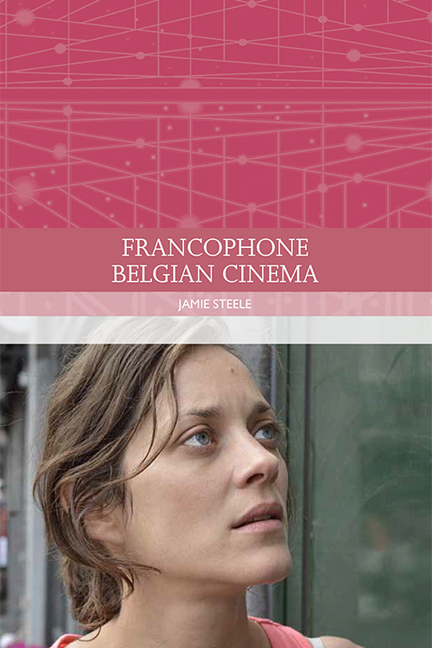Book contents
- Frontmatter
- Contents
- List of Figures
- Acknowledgements
- Traditions in World Cinema
- Introduction: Regional/National/Transnational Debates in Francophone Belgian Cinema
- 1 The (Francophone) Belgian Film Ecosystem: Trends in Production, Distribution and Exhibition
- 2 ‘No Future’: Social Marginalisation, Social Precariousness and Depictions of Seraing in Le gamin au vélo (Jean-Pierre and Luc Dardenne, 2011) and Deux jours, une nuit (Jean-Pierre and Luc Dardenne, 2014)
- 3 ‘Stills’ and Fragmented Families: Contemplating the Private Sphere in Joachim Lafosse’s Wallonia
- 4 From Slag Heaps to Cliffs: The ‘Marked’ Regional Landscape in Cages (Olivier Masset-Depasse, 2006)
- 5 The Francophone Belgian Road Movie: Eldorado (Bouli Lanners, 2008) and Ultranova (Bouli Lanners, 2005)
- 6 Lucas Belvaux’s Return: The Thriller Genre and Heists in Liège
- Conclusion
- Works Cited
- Films Cited
- Index
4 - From Slag Heaps to Cliffs: The ‘Marked’ Regional Landscape in Cages (Olivier Masset-Depasse, 2006)
Published online by Cambridge University Press: 29 April 2021
- Frontmatter
- Contents
- List of Figures
- Acknowledgements
- Traditions in World Cinema
- Introduction: Regional/National/Transnational Debates in Francophone Belgian Cinema
- 1 The (Francophone) Belgian Film Ecosystem: Trends in Production, Distribution and Exhibition
- 2 ‘No Future’: Social Marginalisation, Social Precariousness and Depictions of Seraing in Le gamin au vélo (Jean-Pierre and Luc Dardenne, 2011) and Deux jours, une nuit (Jean-Pierre and Luc Dardenne, 2014)
- 3 ‘Stills’ and Fragmented Families: Contemplating the Private Sphere in Joachim Lafosse’s Wallonia
- 4 From Slag Heaps to Cliffs: The ‘Marked’ Regional Landscape in Cages (Olivier Masset-Depasse, 2006)
- 5 The Francophone Belgian Road Movie: Eldorado (Bouli Lanners, 2008) and Ultranova (Bouli Lanners, 2005)
- 6 Lucas Belvaux’s Return: The Thriller Genre and Heists in Liège
- Conclusion
- Works Cited
- Films Cited
- Index
Summary
I make films that I have to make. Not necessarily those that I want to produce. However, what has been most integral is, hopefully, trying to be accessible. I am proud of Cages. I did not abandon my own convictions. My only limits have been financial. (Masset-Depasse in Bradfer 2006c: 46) (Emphasis added)
The majority of Belgian films need France for financing and to have visibility […] All Belgian filmmakers want, and hope, to be recognised by France, the country of culture. (Masset-Depasse 2013, pers comm).
Drawing on Hjort's (2009) typologies of cinematic transnationalism, this reading introduces ‘marked’ and ‘unmarked’ cinematic transnationalism in relation to the film's setting and how the landscapes of Nord-Pas-de-Calais are framed. Hjort defines a ‘marked’ form of cinematic transnationalism as being when ‘the agents who are collectively its [the film’s] author […] intentionally direct the attention of viewers towards various transnational properties that encourage thinking about transnationality’ (2009: 13–14). The film's DVD includes a detailed and informed dialogue between filmmaker Olivier Masset- Depasse and the producer of Versus Productions, Jean-Henri Bronckart, which begins to outline some of the decisions taken at the level of production that have impacted on the film textually. Masset-Depasse acknowledges that the shift in the production of the film represents ‘a true co-production that has become artistic’ (Masset-Depasse and Bronckart 2006). The quotation that opens this chapter further evinces the film's ‘marked’ status by pointing to the financial limitations and restrictions. In his original script, Masset-Depasse had written the film with the premise that it was located in his hometown city of Charleroi. In an interview with the filmmaker, Masset-Depasse (2013) discusses at length some of the changes that were made at an artistic level as a result of the relocating of the action across the conterminous border in Nord-Pas-de-Calais. What is more, the filmmaker strictly located his short film Chambre froide/Cold Storage (Olivier Masset-Depasse, 2000) in his hometown city, with distinct landmarks being drawn on as local and cultural articulations. In this sense, we are encouraged to interpret the film through the lens of cinematic transnationalism in industrial contexts (production, distribution and exhibition) and in terms of the film's aesthetics.
- Type
- Chapter
- Information
- Francophone Belgian Cinema , pp. 105 - 129Publisher: Edinburgh University PressPrint publication year: 2018



